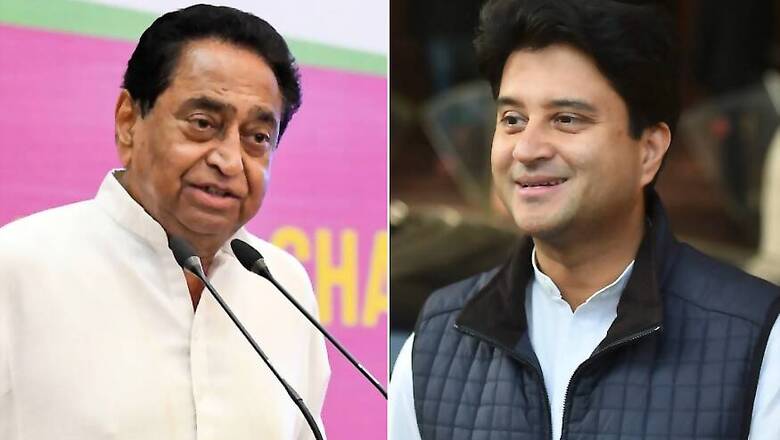
views
Bhopal: Since the Kamal Nath-led Congress government in Madhya Pradesh plunged into a crisis on March 9, the events in the state have remained in the eye of a political storm in the country. The Madhya Pradesh government was pushed to the brink of collapse after a sulking Jyotiraditya Scindia, along with 17 MLAs, virtually revolted prompting Chief Minister Kamal Nath to call a late-night cabinet meeting where around 20 ministers tendered their resignations.
As the Congress and the BJP battle it out at the Supreme Court over conducting a floor-test in Madhya Pradesh Assembly after the saffron party sought an immediate trust vote against the Kamal Nath government, here’s a look at the key players in the political crisis.
Jyotiraditya Scindia:
The Scindia family scion has been the key player who brought about an unprecedented political uproar in Madhya Pradesh. While Kamal Nath struggled to keep his flock together, Jyotiraditya Scindia pulled the rug from under him by joining the Bharatiya Janata Party. Scindia was formally inducted into the saffron party on March 11 in New Delhi.
In the political tug of war, 22 elusive MLAs, mostly from Scindia camp, hold the key to the fate of the Congress government if at all a floor test takes place in the MP assembly.
It all reportedly began with Scindia’s aspirations for a Rajya Sabha nomination, which he bagged from the BJP as he swapped parties despite a having political career at stake.
Digvijaya Singh
The Congress veteran, despite having a lack of designation in the Kamal Nath government, has been rubbing shoulders with the Chief Minister in the hour of crisis. Singh has been coming down heavily on the BJP since the crisis.
On Wednesday, Singh while landed in Bengaluru in the wee hours and insisted on meeting the Congress rebels “held captive by the BJP there”, but in vain. His prayer to meet the rebels was further rejected by the Karnataka High Court.
Singh has been touted as a pivotal player with his palpable influence on the party and reportedly posed obstruction in Scindia’s aspirations in the Upper House.
Recently, Singh secured a Rajya Sabha ticket from the Congress.
Chief Minister Kamal Nath
With a political career spanning four decades, Congress stalwart Kamal Nath has exhibited a calm approach towards the crisis and has consistently maintained that the Congress party has the numbers and will survive the storm, besides claiming that the rebel MLAs are in touch with him. The Madhya Pradesh Chief Minister on Thursday lashed out at the BJP for “its efforts to topple a healthy government.”
Shivraj Singh Chouhan
The BJP veteran, Shivraj Singh Chouhan, is leading the charge for the saffron party, despite not being an office-bearer in the state unit. Since the rebellion erupted in the Congress government, Chouhan had been instrumental in keeping the state unit together and in devising strategies with the party high command in New Delhi.
Governor Lalji Tadon
A former BJP veteran from Uttar Pradesh, Governor Lalji Tandon, was instrumental in exerting pressure on the Kamal Nath government by ordering a floor test on March 16. He also delivered inaugural address in the assembly despite reservations from the senior BJP leaders. However, as the speaker postponed the session till March 26 over the coronavirus threat, he quickly shot another letter ordering a second floor test on March 17.
Tandon holds the key to keep things moving in the state and would be the person in charge if at all the President’s rule is invoked in the state. The BJP counsel, too, had referred to Governor’s directives while arguing in Supreme Court on MP BJP’s petition.
Speaker NP Prajapati
Madhya Pradesh assembly speaker NP Prajapati had been at the centre of the crisis from withholding his assent on resignations of rebel MLAs to postponing the session on March 16. While Prajapati accepted the resignations of six MLAs from Scindia camp, who were earlier sacked as ministers, his approval is pending on the remaining 16 lawmakers. He has repeatedly claimed that these resignations can’t be accepted unless these MLAs personally present themselves in front of him and affirm that they are not being coerced into resigning from the House.
The speaker holds constitutional powers to decide the course of resignations, floor test and proceedings of the House.




















Comments
0 comment